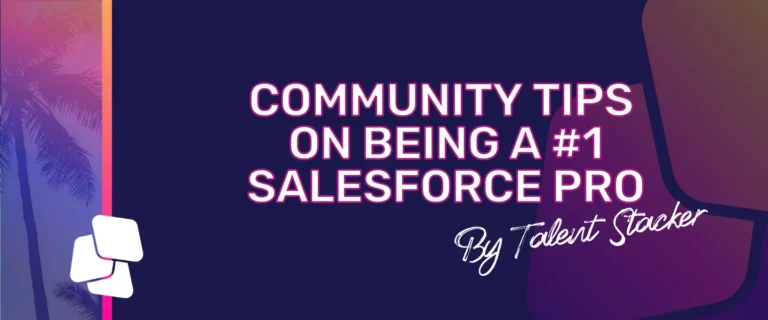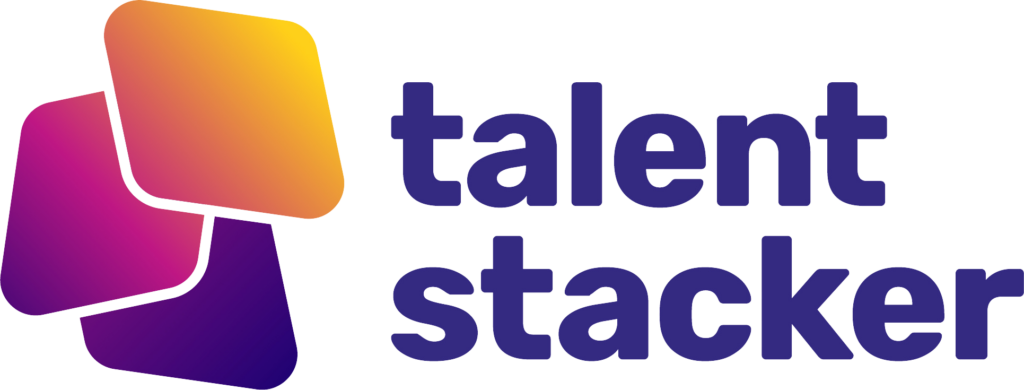What is the one piece of advice you would recommend to everyone to really bring value to your company?
What’s your NUMBER 1 pro tip for rocking your role as a #Salesforce Admin, Consultant, or Professional. 👇 We wanted to know! So we polled the Talent Stacker Community. Here is what they said:
I’m still working on my cert but so far grit and determination along with perseverance and knowing there’s no such thing as failure is keeping me going. Staying the course. {Chris Ewing}
Become an expert at Googling the answer and also using Salesforce specific resources for answers–Trailhead, Trailblazer community, Slack groups, Discord channels, people you know–inside and outside of your company, communities like Talent Stacker, even LinkedIn! 😎 {Talia Johnson}
Be sure that you fully understand the problem, not just the surface issues, that is being brought to you. Ask more questions to get a better understanding in order to better solution. {Jacob Black}
Keep learning every day and don’t be afraid to ask your Salesforce ohana for help if you’re stumped! {Jenay R.}
Seek to understand rather than know all the answers. {Lamar Miller}
Never stop learning. {Hunter Clifton}
Communication is key.🔑 Ask probing and clarifying questions, speak up and share your point of view and don’t be afraid to delegate. {Sabrina Santana}
Tap into your resources! Trailhead, groups, & community. You are not alone. Don’t be afraid to ask for help. {Scarlett Anderson}
Listen! Really listen to the question, instructions, speakers, etc. You’ve got to listen, make sure you understand, and then take action. {Michelle Jadwin}
As a HUMAN, it’s important that we can empathize with people. Whether you like it or not, every conversation you have is a potential negotiation. Getting coffee, VP of sales asking you to build a field, hearing about a coworker’s kid’s soccer game. Use labeling and mirroring to better empathize with people and understand why they’re asking. {Geren Woodbridge}
Documentation is important. Put the description on everything you build. {Emily Guthrie}
Listen and take detailed notes! Writing out our thoughts is so important to understanding complex problems 🙂 {Andrew Simons}
Be organized in all your spaces. Start with your workspace. Then move to your computer. Adjust files, setup apps and backgrounds that will make your job easier. Then in SF create a uniform system on how descriptions will be input. Then last track what work you do in the org. {Cheyne McDonald}
I think a love of learning helps any role, especially one as diverse as a Salesforce Admin. As the company evolves, there will always be new features and new ways to solve problems for the companies we work for. I love the Ohana of the Trailblazer community because people are willing to push others forward. {Lauren Bem}
I can only speak from a soft skills perspective at this point, however I feel that communication and rapport with fellow co workers and stake holders would be vitally important. {Devon Burris}
I call it ‘connection before collaboration’. Meaning that before I dig into collaborating with someone I find a way to connect with them. Whether that’s genuinely asking them how their day is, maybe how their kids soccer game was, if they watched the last Yellowstone episode, give recognition of a job well done, or tell them something I appreciate about them, etc. Whatever I choose to do I do it with authenticity. I’ve found that this connection first approach has dramatically increased the level of productivity I have with my co-workers. We all want to be heard, seen, and connected and if that can occur than our output is likely to increase. {Chantille Campbell}
Listen and don’t afraid to ask questions when you need clarification. {Kubra Yalcin}
My #1 pro tip — manage expectations! It is easy to dream up a super idea, but sometimes the steps to get there need to be built, or maybe the juice is not worth the squeeze. But being realistic in what you are capable of, what is possible, what brings value, and what to expect for those wanting this great idea will pay you back 10x! Not just for this project, but every project. This idea of course has several other great traits behind it such as: communication, trust, teamwork, and vision to name a few. {Derrick Brown}
Perseverance. That’s it. Keep going and STAY ON TARGET! {Jenna Lundeen}
My number one tip I’ve learned in my role as an admin is to dig first into whatever resources are available before asking for help within my team. Our ecosystem is so vast, and there are SO many resources out there – between SF’s help pages, the multitude of forums, etc – a lot of times what I’m looking for has already been answered. It’s not only about saving the time and mental space of the folks on my team from having to help me with something I can figure out on my own, but when I have to hunt for the answer, I typically remember it better than if someone just told me the answer. {Emily Stephens}
Have an ownership mindset!!! {Larry Lee}
Document, document, document! You might not be the next person working on that piece of the org, or you might find it in a year and need to remember why you did something a certain way. Write as many details as you can, in a place you or someone else will find it, and you’ll save yourself a lot of headache! {Stephanie Metal}
Adaptability; most admins are are making Salesforce work for other people and that means being able to adapt and willing to adapt to their needs as well. Along with that come so many other skills whether it is listening, being flexible, and also working well with others. {Collin Koogler}
Never underestimate the power of teamwork! This can be as simple as being mindful of the energy you bring to a group or offering someone having a bad day some grace. It can be offering to help on a project or even as simple as saying thank you. It is remembering we’re all in this together and a rising tide lifts all boats. {Sara McCort}
Attention to detail when creating and running test scripts. As a BA, this will help eliminate rework. {Ryan Lloyd}
Set boundaries and expectations to avoid burnout! {Justin Hecht}
Go slow to go fast, especially when gathering requirements. Asking probing questions and listening carefully at the beginning sets you up for success at the end. {Martina Maven}
My pro tip would be to get out of your comfort zone and keep working towards your goals. You will get better with time in your technical expertise but if you have soft skills and people love working with you, that’s what you need 🙂 {Nagma Khan}
Try to do as many ride-alongs as you can when you first start out. The quicker you can learn the business processes and workflows of your organization, the more value you can provide through optimization, and the happier all your departments will be that their ideas were heard. If you don’t know how to do something and your co-worker does, ask if you can watch them while they do it. Thank them for teaching you. There’s a ton to learn when you first start out, and being eager and open to learning as much as possible is the best attitude to have for your career in the long run and your ability to provide value immediately. {Danielle Cress}
Listen, listen and keep listening. Understanding the story and the problems of the client is super important for any consultant. {Suhita Parundekar}
Get comfortable recording and sharing short screen-share videos talking through an issue, demonstrating new functionality, or clarifying a concept. It’s much easier and faster than attempting to explain everything in writing and a handy, user-friendly method for documenting your org. Your colleagues and your clients will surely appreciate it! {Kieran Campbell}
The ability to read between the lines and to anticipate a client’s needs…sharpen those mind reading skills. {Van Nguyen}
Ask the right questions and listen carefully. And of course, Google! {Elissa Stern}
Listen, listen, listen, and don’t be afraid to ask additional questions for clarification! Admins are certainly wizards, but the people who live and breathe the business processes everyday are experts in their own right. You may need to ask a similar question multiple times to dig into the root of the problem. {Heidi Schaefer}
Remember it’s all about the End User! {Kyle Cochenour}
It takes a whole set of hard and soft skillls and to succeed as an admin, consultant or professional. But a pro tip is to be RESOURCEFUL and have a RESOURCEFUL mindset. Examples include being RESOURCEFUL in:
– creative/out-of-the-box thinking
– adding value to team/project
– seeking out connections with others
– finding technical and non-technical answers
– finding study materials (lifelong learner)
– finding alignment with stakeholders
– effective communication
– collaborating with and influencing others
– using tools/applications to help manage the work
– managing available resources
– and more
{Sheley Lee}
As a consultant, remember that you may sometimes need to find the “question behind the question.” Sometimes you’ll find that what your client really wants can be accomplished in a way that’s different than what they (or you) may initially think. If you take the time to really understand what’s going on in their business and why they are requesting a certain process or change, you move beyond “doing tasks” and can actually provide solutions. {Annie Donahue}
One insight I would share is to get honest about your own weaknesses (and I don’t mean in a shaming or self-berating way, just a real “I am human and have weaknesses” kind of way ).
And THEN seek out and uplift others who are strong in areas where you are weak. Celebrate those strengths others have that you do not. And learn together how to be interdependent and collaborate! 💞 {Tena Stromgren}
Never assume that all affected business users are aware of change requests. Often Admins (and IT folks in general) partner with many more business units than the business units themselves do. We have crossover knowledge of business functionality and user roles that others might not be aware of. Therefore, it’s critical that if we have concerns regarding the impact of a design request – especially with respect to other areas of the business – we need to speak up. Also, along these lines, it’s good to verify that there is a clear communication plan to make sure all affected business users are alerted of upcoming and implemented changes. {Wendy Mlller}
From my experience in other professions, I think knowing how to get the work done and also keep things enjoyable at the same time is something to strive for. I really enjoy cultivating a fun positive work environment, while also being really productive. {Jennifer Stephenson}
Listen carefully, and then restate/rephrase the request as you understood it to the client/stakeholder to eliminate any misunderstandings, so that both parties are on the same page. This is the time to clarify the task before any time is sunk into it. {Esmail Bonkdarian}
Share what you learn. {Anjali Truitt}
Commit to lifelong learning. Salesforce is always changing and improving so you will always be learning new things. Be thankful for this because it prevents complacency and boredom. {Arthur Murphy}
Lead with empathy! If you show your team mates and clients the same care and concern you would show to a family member- it makes communication better and they appreciate the connection. {Cheryl Colombo}
Ask questions even if you think you’ll sound dumb. There’s likely someone else who needs to know what YOU need to ASK. Sounding dumb is better than leaving the conversation not knowing. {Hieu Nguyen}
Empathy. Your end users are human. Remember that everything you do can either make their days easier or harder, so don’t discount understanding them. {Dana Koglin}
Simplify, simplify, simplify. Just because your first hunch to a solution is 500 steps does not make you a more proficient admin. Ask yourself first- how can I make this easier? {Rachel Shumway}
For me 1) Documentation is the key and a must for every Salesforce org 2) User adoption also plays a vital role in understanding how effectively the features are being used by end users and it needs to be revised as and when the adoption is low/not being used. {Krishnamurthy KA}
Be trustworthy and transparent! {Jana Walker}
Building relationships is more important than any sort of money. If you’re focused on those relationships… then the money will just naturally be there. Relationships > revenue {Joshua Bourdeau}
Never implement a request without having a full understanding of the context, the associated business process(es), the stakeholders that will be impacted by the change, the effort it will take to implement, and the value this change will bring to the business. {Aude Cozens}
Learn how to leverage and contribute to our wonderful community. {Jenny Gonzalez Flicker}
Listen – ask – think – speak. It is absolutely crucial to understand what problem your stakeholders want to solve. They should get what they need and not what they want. {Ralf Hamester}
Be willing to volunteer to create documentation where it’s lacking so that others coming behind you will be in a better position to maintain a project. {Dewayne Scott}
–





